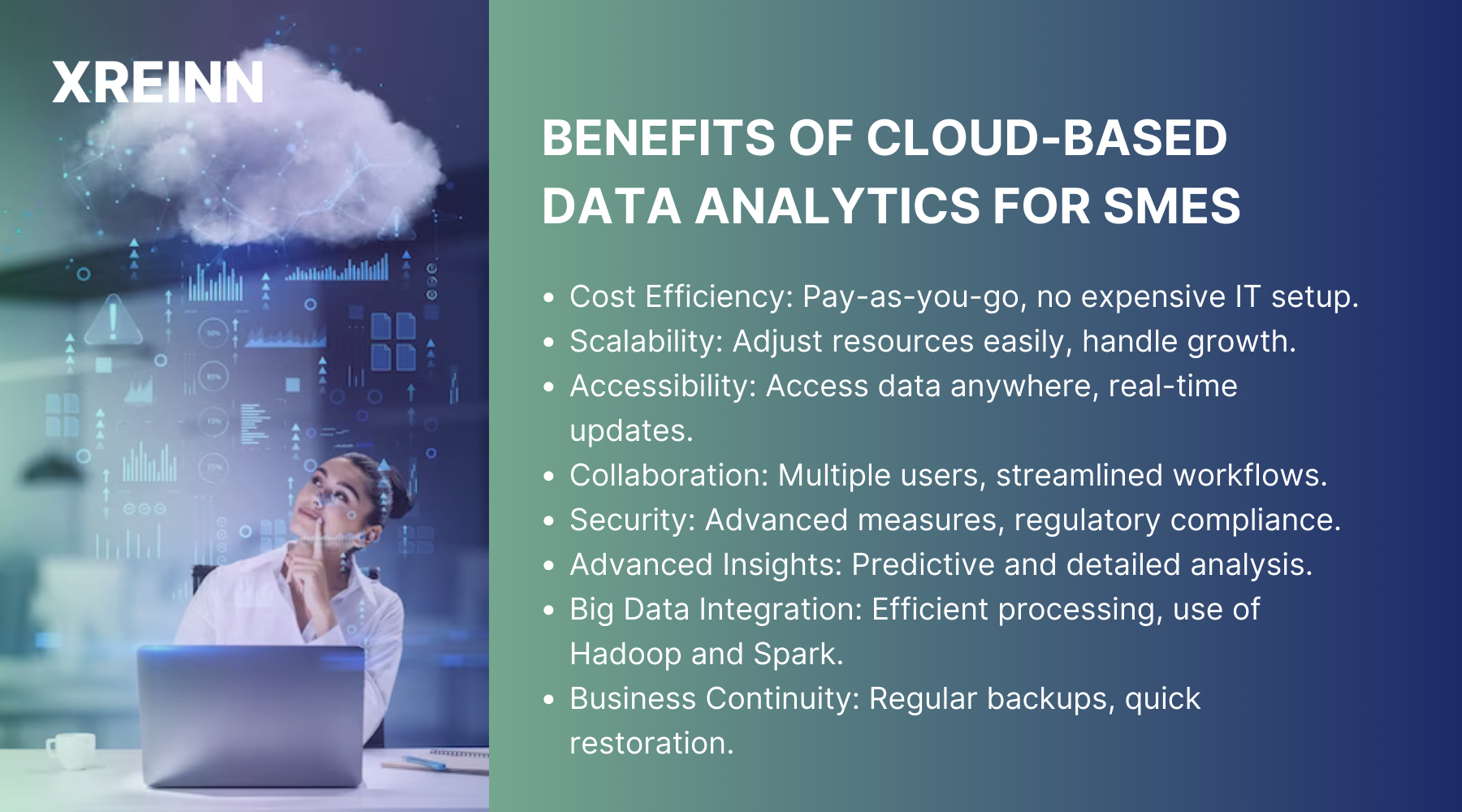Data Analytics
Cloud-Based Data Analytics: Benefits and Implementation Strategies
Jul 10, 2024
Data analytics is no longer the exclusive domain of large enterprises. Cloud-based data analytics has become a game-changer for small and medium-sized enterprises (SMEs). This technology levels the playing field and provides SMEs with the tools to survive in a competitive market. Cloud-based data analytics can help your business become more efficient and productive by using cloud-based data analytics.
With access to real-time insights and advanced analytical tools, SMEs can make better strategic decisions. This shift empowers businesses to respond quickly to market changes and customer needs.
Here we highlight the the various benefits of cloud-based data analytics as well as practical implementation strategies.
Understanding Cloud-Based Data Analytics
Cloud-based data analytics is the practice of analyzing data stored in the cloud, utilizing various analytical tools and services offered by cloud providers. Unlike traditional on-premise analytics, which requires significant investment in hardware and infrastructure, cloud-based solutions are accessible via the Internet, offering flexibility and scalability.
For SMEs, this means you can access powerful data analytics tools without the hefty price tag. Tools such as Google Analytics, AWS, and Microsoft Azure provide comprehensive analytics capabilities, making it easier to gather, process, and analyze data from various sources.
Benefits of Cloud-Based Data Analytics for SMEs

The useful benefits of cloud-based data analytics for SMEs are given below:
Cost Efficiency
The cost-efficiency of cloud-based analytics is one of its biggest advantages. Traditional systems need a large upfront investment in hardware, software, and maintenance. However, cloud-based solutions use a pay-as-you-go model, meaning you only pay for the resources you use. This is especially helpful for SMEs, as it lowers the financial barrier and helps with better budget management. Additionally, it removes the need for expensive IT infrastructure and maintenance
Scalability
As your business grows, your data volume increases. Cloud-based analytics solutions provide unmatched scalability, allowing you to adjust resources based on your needs. This flexibility ensures you always have the right amount of resources, never too much or too little. You can easily handle large volumes of data as your business expands. During peak times, you can scale up resources, and during slower periods, you can scale down, optimizing costs and efficiency.
Accessibility
With cloud-based analytics, you can access your data from anywhere, at any time. This accessibility is crucial for businesses with remote teams or multiple locations. Real-time data updates and insights mean you can make informed decisions quickly, no matter where you are. This ensures that your team stays productive and informed, regardless of their physical location.
Enhanced Collaboration
Collaboration is key to successful data analysis. Cloud-based solutions facilitate improved teamwork by allowing multiple users to access and work on the same data sets simultaneously. This shared access helps streamline workflows and fosters a collaborative environment where insights can be quickly shared and acted upon. Teams can collaborate in real time, leading to faster problem-solving and decision-making.
Security and Compliance
Security is a top priority for cloud providers. They invest heavily in advanced security measures, including encryption, multi-factor authentication, and regular security updates. Additionally, many cloud providers comply with industry standards and regulations, ensuring that your data is not only secure but also compliant with relevant laws. This means your data is protected against breaches and unauthorized access.
Advanced Analytics Capabilities
Cloud-based analytics platforms often come with advanced analytical capabilities such as machine learning and artificial intelligence. These features allow SMEs to derive deeper insights and more accurate predictions from their data, enhancing decision-making processes. For example, predictive analytics can help forecast sales trends, customer behavior, and inventory needs, providing a strategic advantage.
Integration with Big Data Technologies
Cloud platforms are designed to handle big data, allowing SMEs to process and analyze vast amounts of data efficiently. Integration with big data technologies like Hadoop and Spark enables businesses to analyze structured and unstructured data, providing a more comprehensive understanding of their operations and market trends. This helps in uncovering hidden patterns and insights that can drive business growth.
Business Continuity and Disaster Recovery.
Cloud-based solutions offer robust disaster recovery and business continuity options. Data stored in the cloud is backed up regularly and can be restored quickly in case of a disaster. This ensures that your business operations can continue with minimal disruption, protecting your valuable data from loss. This level of reliability is crucial for maintaining customer trust and operational efficiency.
Implementation Strategies for Cloud-Based Data Analytics
Here are some useful implementation strategies for cloud-based data analytics:
Assessing Business Needs
Before diving into cloud-based analytics, it’s crucial to assess your business needs. Identify your key business goals and data requirements. What insights do you need to drive your business forward? Understanding these needs will help you choose the right cloud analytics solution that aligns with your objectives. Conduct a thorough analysis to ensure that your chosen solution addresses all your business challenges.
Planning and Budgeting
Once you have identified your needs, it’s time to plan and budget. Estimate the costs involved in implementing a cloud-based analytics solution, including subscription fees, potential data migration costs, and any additional services you might need. Setting a clear budget and timeline will help ensure a smooth implementation process. Factor in training and support costs to ensure a comprehensive plan.
Data Migration
Migrating your existing data to the cloud is a critical step. Develop a clear migration strategy to ensure data integrity and security during the transfer. This might involve working with your cloud provider to create a secure migration plan and testing the process to address any potential issues before the full migration. Ensure that the migration process is seamless and causes minimal disruption to your business operations.
Integration with Existing Systems
Integrating cloud-based analytics with your current business systems is essential for seamless data flow. Ensure that your new analytics tools can work harmoniously with your existing software and databases. This integration will help you maintain a unified view of your data across all platforms. Compatibility and interoperability are key to a successful integration.
Training and Change Management
Implementing a new system requires training your team on how to use it effectively. Provide comprehensive training sessions to ensure everyone is comfortable with the new tools and processes. Additionally, manage the transition carefully to address any resistance or concerns from your team. Effective change management ensures a smooth adoption process and maximizes the benefits of the new system.
Continuous Monitoring and Optimization
Cloud-based analytics is not a one-time implementation. Regularly monitor the performance of your analytics tools and processes to identify areas for improvement. Continuously optimizing your system will ensure you are getting the most value from your data analytics efforts. Set up regular review meetings to assess performance and make necessary adjustments.
Conclusion
Cloud-based data analytics offers a wealth of benefits for SMEs, from cost efficiency and scalability to enhanced collaboration and security. Implementing these tools will allow you to make informed decisions, improve customer experience, and optimize operations. You should assess your business needs, plan your budget, and integrate your current system seamlessly to get started.
Train your team effectively and continuously monitor and optimize your processes. Invest in cloud-based data analytics to ensure your business's long-term success. By utilizing real-time data insights and maintaining flexible, scalable infrastructure, you will be able to stay ahead of the competition.

Data Analytics
Jun 27, 2024Master key concepts in data analytics with practical tips to enhance decision-making and achieve success in your projects and professional growth

Data Analytics
Jul 01, 2024Learn the essential stages of the data analytics workflow to turn your data into valuable business insights and drive growth.

